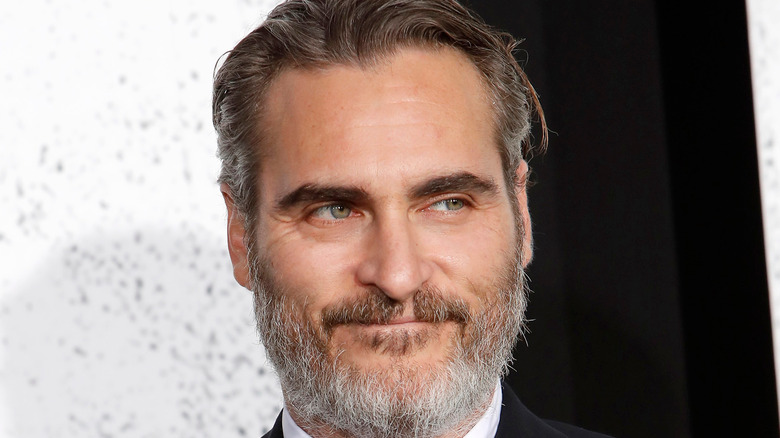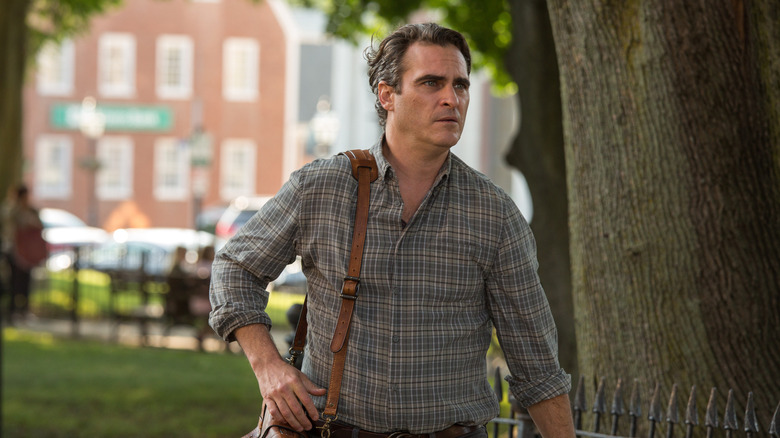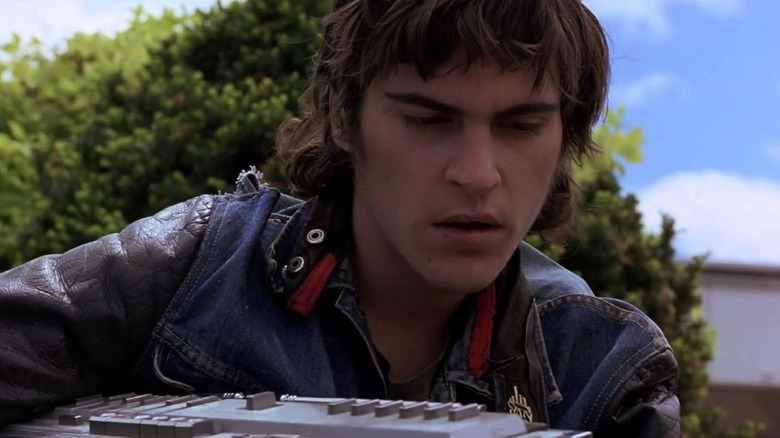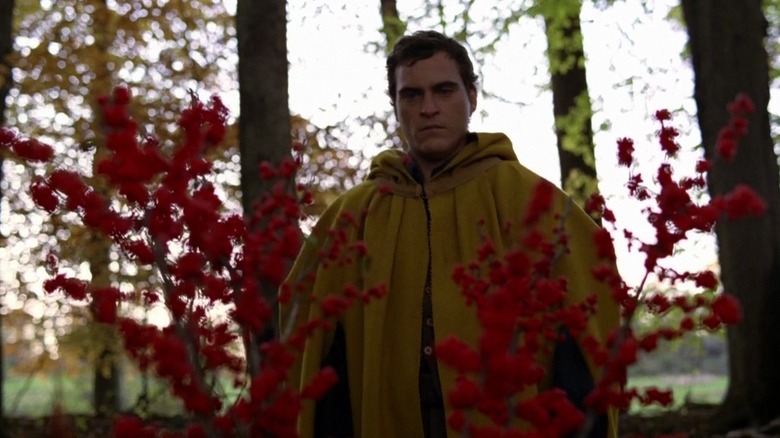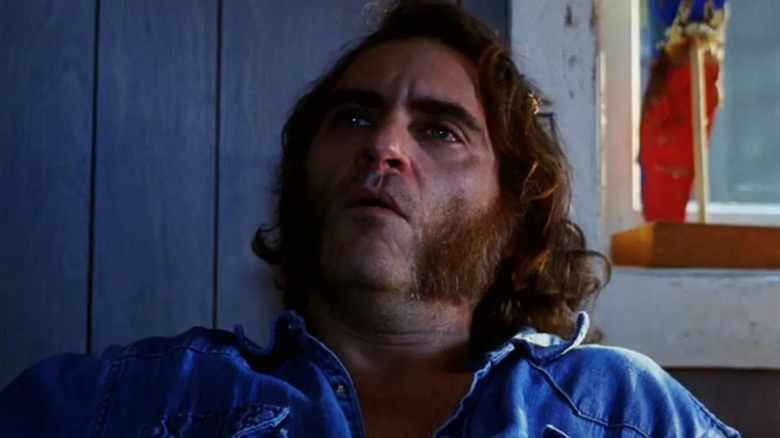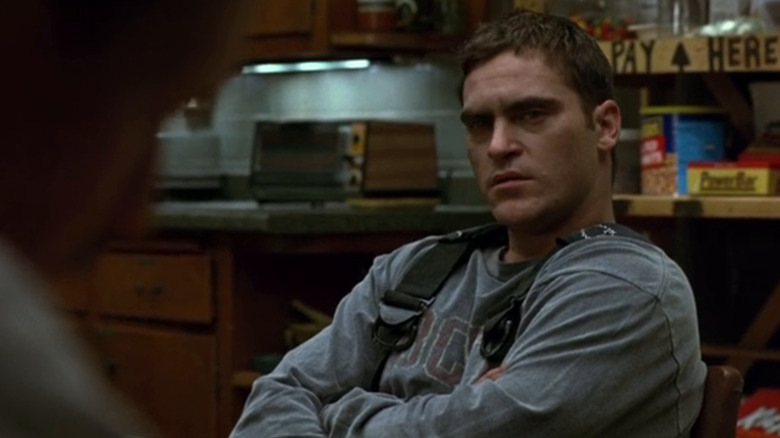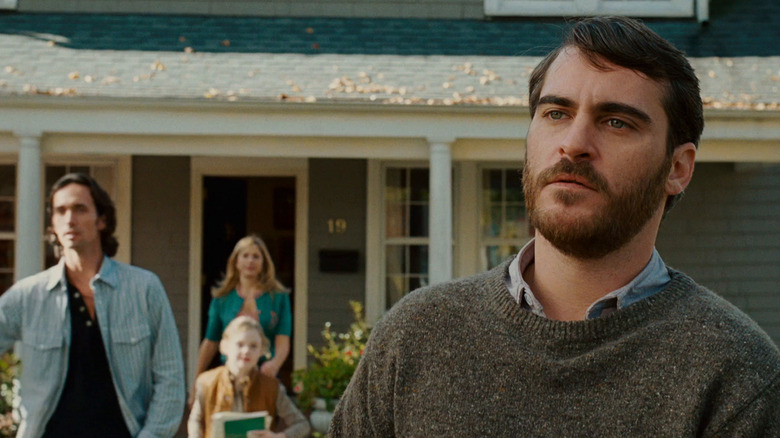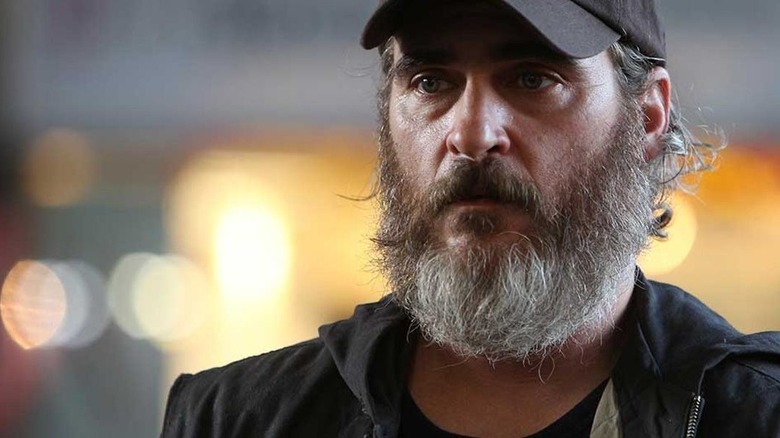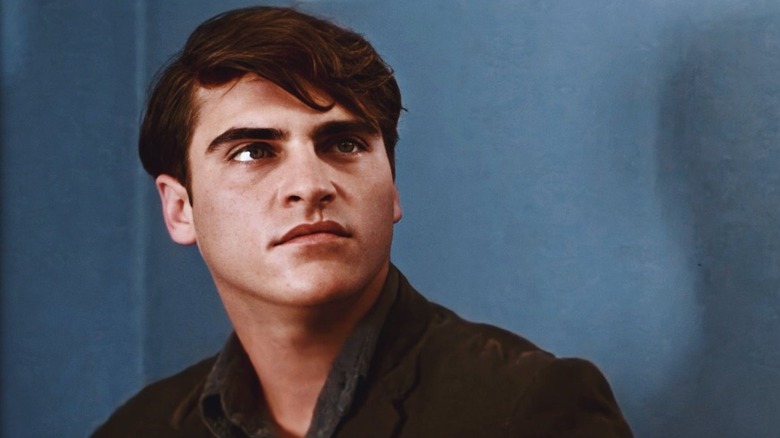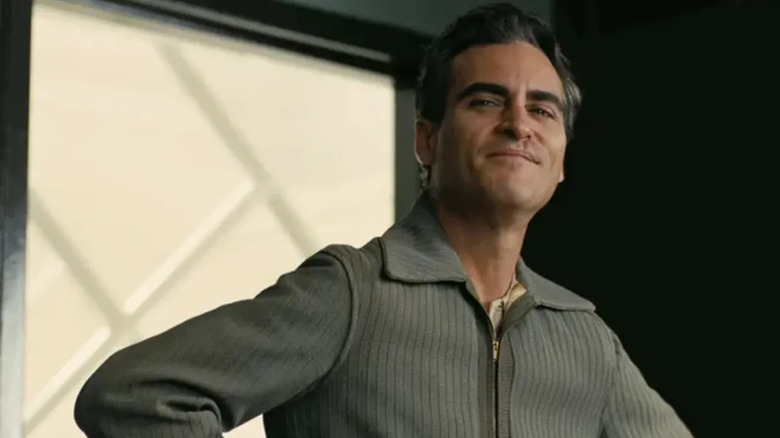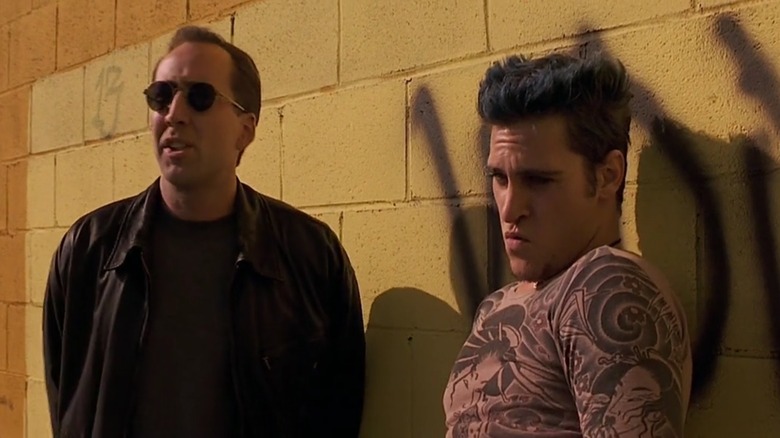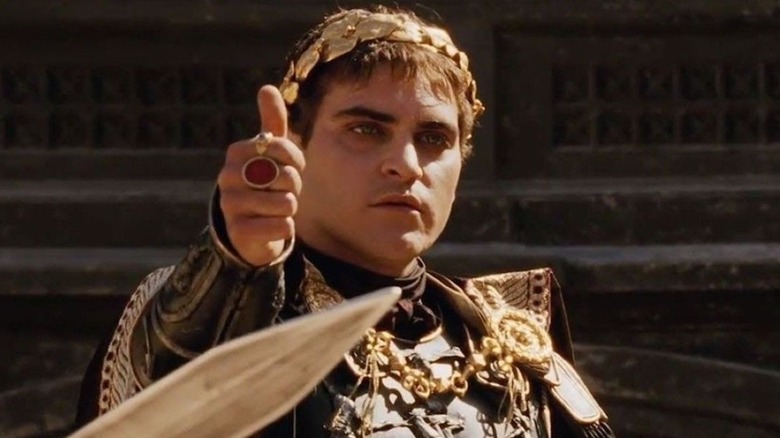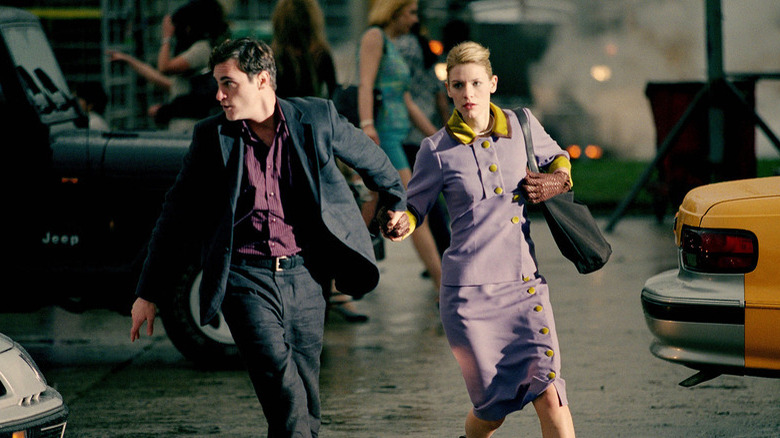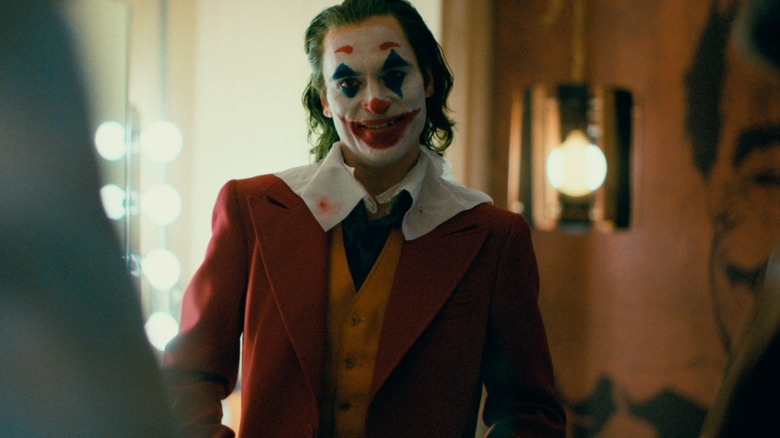Joaquin Phoenix's 7 Best And 7 Worst Movie Roles Ranked
Joaquin Phoenix is one of the most celebrated and universally decorated actors of his generation. From his early career in the 1990s to his most recent projects, Phoenix has routinely dialed up his performances to a solid 11. A method actor, he fully immerses himself in every role he's given, often leading to some emotionally gripping characters, each wholly unique from one another.
Whether he's playing a drugged-out hippie private investigator, a tyrannical Roman emperor, a traumatized military veteran, or a famed comic book villain, Phoenix continues to earn acclaim for his cinematic performances. The number of accolades he's received over the years — including the Academy Award for best actor — are all clear evidence of this fact. He has portrayed mature, nuanced characters in indie films, but has also made a name for himself by starring in mainstream films like "Gladiator" and "Joker." The continued success of his career speaks for itself, with the New York Times naming him one of the best actors of the 21st century.
However, like any actor, Phoenix's filmography is not without the occasional flop. Here are some of the best films to feature Joaquin Phoenix, as well as some of the worst movies he's ever appeared in.
Worst: Irrational Man
In 2015, Phoenix collaborated with Woody Allen and Emma Stone for the mystery drama film, "Irrational Man." In it, Phoenix plays Abe Lucas, a downtrodden philosophy professor at a New England college who forms a close bond with his idealistic student, Jill (Stone). As Lucas searches for a will to live, he and Jill happen to overhear a conversation at a diner that helps Lucas get a new lease on life.
Like many of Allen's later films, "Irrational Man" was met with predominantly mixed reviews, with many critics finding it too similar to Allen's earlier films of the 1970s and 1980s. "Woody Allen's 'Irrational Man' ... is a tongue-in-cheek mystery which is neither quite scary and serious enough to be suspenseful, nor witty or ironic enough to count as a comedy," said the Guardian's Peter Bradshaw.
Phoenix's penchant for playing moodier characters comes in handy with "Irrational Man," which is far more melancholic than Allen's similarly-veined films. However, Phoenix's lethargic performance pairs less than fittingly with Allen's quirky script, resulting in a film that doesn't quite gel together.
Best: To Die For
Phoenix first came to the public eye after a string of independent films that saw him take on unorthodox roles. Among them was 1995's "To Die For," a satirical dark comedy that saw him working opposite established actors like Nicole Kidman and Matt Dillon.
Suzanne Stone (Kidman) is an aspiring journalist who wants nothing more than to get on TV. After her husband (Dillon) encourages her to settle down and start a family with him, Suzanne decides to convince a high school delinquent (Phoenix) and his friends to murder him.
Debuting at the 1995 Cannes Film Festival, "To Die For" garnered positive reviews from filmgoers and critics alike, with Kidman's Suzanne earning repeatedly high praise. "As a satire on the American obsession with celebrity and fame, the movie is nuanced and haunting. And for the most part, [director Gus] Van Sant keeps the tone chillingly light and ironic," said the Washington Post's Hal Hinson.
As often as Kidman steals the show, Phoenix still delivers a career-making performance as Jimmy, the impressionable young man Suzanne manipulates into doing her bidding. Cowering behind a rough exterior, Jimmy is a youth clearly lacking direction, having never received genuine affection from another person before — a weakness Suzanne exploits for her own benefit. It's one of Phoenix's earliest roles, and one that contributed to his continued exposure in Hollywood in the late '90s.
Worst: The Village
Phoenix has maintained several lasting creative partnerships with some of the industry's leading directors, notably Paul Thomas Anderson and Gus Van Sant. However, not all of Phoenix's collaborations with well-known filmmakers have yielded positive results. His 2004 pairing with horror director M. Night Shyamalan on "The Village," for example, is frequently hailed as one of the most underwhelming movies in either of their careers.
Set in a remote Pennsylvania community, "The Village" follows its occupants as they are terrorized by mysterious, inhuman creatures lurking in the woods that surround the town. In desperate need of outside help, a blind woman (Bryce Dallas Howard) embarks on a journey through the monster-populated forest, uncovering the hidden secrets of the village itself.
Reviews for "The Village" often fall into two camps: Most decry it as one of Shyamalan's weakest and most disappointing films, while retrospective reviews have complimented the film for its performances, twist ending, and themes. Regardless, the movie still remains a point of contention among moviegoers and Shyamalan fans, even if it was a financial success (grossing $257 million against its $60 million budget, per Box Office Mojo).
Phoenix figures into the plot as Lucius, Bryce Dallas Howard's love interest in the film, an adventurous if incredibly laconic young man who wants to venture into the forest. A man of very few words, Lucius is one of Phoenix's most muted performances, lacking the same intrigue or mysterious quality as his other characters.
Best: Inherent Vice
One of Phoenix's most successful artistic partnerships has been with respected filmmaker Paul Thomas Anderson. The second of their cinematic collaborations was 2014's "Inherent Vice," an adaptation of Thomas Pynchon's comedic neo-noir novel. A stark departure from both Phoenix and Anderson's usual brand of films, the movie is a comedic postmodern riff on the traditional detective story, involving numerous interweaving plot threads that grow increasingly more complicated over time.
In sunny 1970s Los Angeles, private detective Doc Sportello (Phoenix) investigates the disappearance of his ex-girlfriend (Katherine Waterston) and her new boyfriend (Eric Roberts). Along the way, he becomes involved with overzealous cops, police informants, nautical lawyers, and a mysterious group known as the Golden Fang.
Translating the spirit of Pynchon's novel to the big screen, "Inherent Vice" was praised as a faithful and loving adaptation of Pynchon's original book. "The film is stupendous: as antic as 'Boogie Nights' and 'Punch-Drunk Love,' but with 'The Master' and 'There Will Be Blood”s uncanny feel for the swell and ebb of history," said The Daily Telegraph's Robbie Collin.
In addition to the complimentary attitude towards the film's screenplay and costume design (both of which earned Oscar nominations), Phoenix's performance in "Inherent Vice" was also met with acclaim. With his straggly hair, period-accurate muttonchops, and consistent bafflement throughout the film, it's a unique role among Phoenix's filmography.
Worst: Ladder 49
After the massive exposure Phoenix received for his starring role in "Gladiator," Phoenix was presented with a variety of new opportunities in mainstream films opposite veteran actors. One of the less successful of these was "Ladder 49," a thriller film featuring Phoenix and silver screen legend, John Travolta.
Responding to a four-alarm fire at a Baltimore warehouse, firefighter Jack Morrison (Phoenix) suffers a serious injury that traps him inside the blazing building. As flashbacks reveal how Jack first joined the fire department, as well as showing his first interactions with his wife (Jacinda Barrett) and his relationship with his fellow firefighters, Jack's mentor (Travolta) mounts a rescue attempt to save him from the mounting inferno.
The split narrative of "Ladder 49" gives it an interesting structure, yet the finished film earned largely mixed to negative reviews. Most complaints were geared towards the movie's overly sentimental plot and themes, with Variety's Brian Lowry commenting, "'Ladder 49' plays, rather, like an old-fashioned, by-the-numbers drama that solidly connects with most of its well-worn cliches." Phoenix does an acceptable job with the lead character, but the stereotypical narrative he's working with bogs the movie down with too much rigid emotion, ending in a performance that's been more or less forgotten among the better roles in his career.
Best: Her
One constant in Joaquin Phoenix's career is that he's always willing to tackle roles many would consider unconventional or even bizarre. This is the case with his leading performance in "Her," an offbeat romantic sci-fi film unlike any other.
Set in Los Angeles in the near future, Theodore (Phoenix) is an introverted writer who longs for an emotional attachment to another person. Purchasing an artificially intelligent virtual assistant named Samantha (voiced by Scarlett Johansson), Theodore slowly begins to develop a romantic relationship with the device, an attraction seemingly reciprocated by Samantha.
Upon its release in 2013, "Her" almost immediately won positive reviews, topping numerous critics' lists for the best movie of the year. "Acerbic, emotional, provocative, it's a risky high dive off the big board with a plot that sounds like a gimmick but ends up haunting, odd and a bit wonderful," said the Los Angeles Times's Kenneth Turan. Earning nominations at the Academy Awards for best picture among other accolades, "Her" won the Oscar for best screenplay.
Alongside the glowing reception to the film's screenplay, Phoenix and Johansson's performances were both praised. Withdrawn and at odds with himself, Theodore is a notably refined role for Phoenix. However, avoiding the somewhat wooden performances he handed in with his other largely silent roles in "The Village" and "Irrational Man," Phoenix soars high, providing the movie with its invaluable heart and soul.
Worst: Reservation Road
Throughout his career, Phoenix has appeared in films that rely on generally promising premises. While most of these movies are entertaining, every so often, Phoenix will star in a movie that fails to live up to the strong central storyline. "Reservation Road" is one illustration of this — a movie that falls flat in delivering on its intriguing concept, and that ultimately wastes the talents of the cast involved.
Dwight Arno (Mark Ruffalo) is a divorced father struggling to maintain his relationship with his son. On their way home from a baseball game, Dwight accidentally hits and kills a young boy with his car, fleeing the scene before the police can arrive. Plagued by intense guilt, Dwight does his best to avoid suspicion, even as the deceased boy's father (Phoenix) obsessively tries to find him.
In spite of its exciting plot line and appearances from Phoenix and Ruffalo, "Reservation Road" was extremely disappointing, with most critics lambasting it for its "manipulative" emotional undertones of the film, as worded by Slate's Dana Stevens. As expected, Ruffalo and Phoenix hand in fairly engaging performances, but the movie's downbeat quality fails to capitalize on their immense acting abilities. The San Francisco Chronicle's Peter Hartlaub perhaps put it best, saying, "Despite some solid acting, the film is lacking in surprises. For all the suffering that these characters endure, there's very little payoff."
Best: You Were Never Really Here
Phoenix has shown a great proclivity for choosing roles steeped in inner psychological and emotional turmoil. Often, these flawed characters are trying, and in some cases failing, to adjust to normal life and achieve some semblance of happiness. Arguably the most heartrending of them all is his main character in Lynne Ramsay's 2017 thriller, "You Were Never Really Here."
Joe (Phoenix) is a military veteran turned hitman dealing with crippling depression. Making a career out of rescuing girls from human trafficking rings, Joe is hired to find a politician's kidnapped daughter (Ekaterina Samsonov), leading to a dark and wide-ranging conspiracy.
Drawing favorable comparisons to Martin Scorsese's seminal "Taxi Driver," "You Were Never Really Here" won instant praise on the international film circuit, competing for the prestigious Palme d'Or at the Cannes Film Festival. "This is a film about pain, and it forces the audience to live in and work through that pain. And it's absolutely worth the effort. By the end it's a transformative experience," said IGN's William Bibbiani.
As Joe, Phoenix manages to strike a taut balance between dialed-back emotion and internal torment. We see his anguish, his turmoil, and the pain he hides behind his eyes — all conveyed expertly through Phoenix's facial expressions and body language. It's a role few actors could convincingly pull off, but in Phoenix's capable hands, the character is heartbreakingly real.
Worst: Inventing the Abbotts
After his well-received performance in "To Die For," Phoenix enjoyed minor success with a handful of movies in the late '90s. Many of these, however, were released to a predominantly poor critical consensus, including "U Turn," "Clay Pigeons," and the 1997 coming-of-age film, "Inventing the Abbotts."
Set in the 1950s, Doug (Phoenix) and J.C. (Billy Crudup) are two hard-working, blue-collar brothers. In the wake of their father's death, the siblings become embroiled in a romance with three wealthy, free-spirited sisters (Liv Tyler, Jennifer Connelly, and Joanna Going).
There's no denying "Inventing the Abbotts" has a talented cast of actors at its disposal — but that's really the only thing that makes the movie worth seeing in the first place. Reviews for the film were mixed to negative, with most critics complimenting the film for the strength of its performances, yet downgrading it for its overly dramatic tone. "This is the kind of material that might have graced a mid-1950s Universal-International weeper. Even then it would have had more energy," said Roger Ebert.
Phoenix does a decent job with the material he's given, portraying a youthful uncertainty over his emotions, at odds with his more domineering brother. But as is the case with all of his fellow actors, his performance isn't enough to transcend the film's shallow attempt at portraying the angsty '50s teen mindset.
Best: The Master
In 2012, Phoenix signed on to star in filmmaker Paul Thomas Anderson's psychological drama, "The Master." A loosely-veiled meditation on Scientology and analysis of what separates a religious movement from a full-blown cult, it's also a profound character study of two drastically different men who find a strange attraction to one another.
Shortly after the conclusion of World War II, traumatized veteran Freddie Quell (Phoenix) aimlessly drifts through civilian life, struggling to keep his anger in check. Finding companionship with a mysterious religious group known as "The Cause," Quell is drawn to The Cause's charismatic leader, Lancaster Dodd (Philip Seymour Hoffman).
Like all of Anderson's films so far, "The Master" was met with widespread praise from both audiences and critics. Named one of the best films of the 21st century by the BBC, it received Academy Award nominations for best actor (Phoenix), best supporting actor (Hoffman), and best supporting actress (Amy Adams). "Written, directed, acted, shot, edited and scored with a bracing vibrancy that restores your faith in film as an art form, 'The Master' is nirvana for movie lovers. Anderson mixes sounds and images into a dark, dazzling music that is all his own," said Rolling Stone's Peter Travers.
As Quell, Phoenix delivers a performance that seems a stylistic precursor to his later role in "Joker." Hiding his pain behind a rictus grin and trying to keep his outbursts under control, he's like a ticking time bomb waiting to go off.
Worst: 8MM
The late '90s marked a period of unremarkable films for Phoenix. By far one of the worst of the movies Phoenix appeared in was 1999's "8MM," a boilerplate neo-noir thriller that relies too heavily on cheap shock value.
Simple, small-time private investigator Tom Welles (Nicolas Cage) is hired by a wealthy widow (Myra Carter) to find out if an 8mm recording she found in her deceased husband's possession is a snuff film. As his investigation draws on, Welles becomes obsessed with finding the origins of the movie, leading him to Los Angeles and the shady underworld of the adult film industry.
One of the more audacious films in Cage's career, "8MM" looks and feels like a cheap, imitative version of David Fincher's "Seven." Containing gratuitous violence and nauseating imagery to elicit a response from viewers, it boasts none of the characteristic suspense inherent in a great thriller — an opinion shared by most critics. "There are some films whose existence makes the world a worse place to live, and this is one of them," said the Los Angeles Times' Kenneth Turan.
Phoenix appears in the film as Max California, a struggling musician turned adult video store employee who reluctantly assists Welles in his investigation. Decked out in Ed Hardy T-shirts, leather pants, and rainbow-colored hairstyles, Phoenix hands in a nuanced enough performance that elevates the otherwise weak script. However, it's a role that doesn't rank nearly as high as his career-defining performances of the 2000s and onward.
Best: Gladiator
2000 was a pivotal year in Phoenix's career. Until that point, he had been featured mostly in secondary and supporting roles, often in films that were of average quality at best. In 2000, all that changed, with the then largely unknown Phoenix securing a role in Ridley Scott's historical epic, "Gladiator."
In 180 AD, the morally corrupt heir to the Roman Empire, Commodus (Phoenix), usurps his father's title, banishing the former emperor's favorite general, Maximus (Russell Crowe). Now a slave, Maximus is forced to compete in gladiatorial fights, all while plotting his revenge against the new emperor.
One of Scott's most critically and commercially successful films, "Gladiator" was a major box office success, grossing $460.5 million against a budget of $103 million (via Box Office Mojo). Virtually every aspect of the movie was laden with praise: The film won the Academy Award for best picture, best actor (Crowe), and best costume design, among many other accolades. "'Gladiator' is designed not just to entertain, but to enthrall. It draws audiences in and immerses them in a reality that is not their own... This is filmmaking on a grand scale," said James Berardinelli of ReelViews.
With "Gladiator," Phoenix finally met a role that catered to his penchant for more idiosyncratic characters. As Commodus, Phoenix portrays perhaps his most loathsome character. Conniving, devious, and completely without morals, he's a man who craves one thing above all others: power.
Worst: It's All About Love
After his ascension to industry stardom with "Gladiator," Phoenix entered a new phase of his career as a world-renowned talent. Capitalizing on his newfound status, he embarked on a string of commercially successful films in the early 2000s. Some of these earned largely middling reviews, but most failed to live up to Phoenix's immense gifts as an actor, existing as minor entries in Phoenix's filmography. The 2003 romance film, "It's All About Love," is a perfect example of this.
As the world faces a potential apocalypse, a married couple (Phoenix and Claire Danes) decide to give their relationship one last shot moments before they're set to sign their divorce papers.
Far and away Phoenix's worst movie, "It's All About Love" was universally panned by critics upon its release. The movie bears few positive attributes, lacking the emotional engagement required to draw viewers in. "This is a near-future, sci-fi love story which is ultimately too ambitious and plain weird for its own good, and too often comes off just looking ridiculous," said Empire's Nick Dawson.
In a rare slip-up for the actor, even Phoenix hands in a subpar performance as John, the academic romantic foil to Danes' world-famous ice skater, Elena. Using a poorly executed Polish accent, Phoenix tries to play a believable main character, but his lack of romantic chemistry with Danes results in his weakest effort to date.
Best: Joker
The crowning achievement of Phoenix's career, "Joker" is not only the best film to feature Phoenix, but it also contains his most memorable performance. The film that won Phoenix his first Academy Award for best actor, it's an unsettling and more grounded look into one of the world's most famous villains, expertly personified by Phoenix.
In the early 1980s, aspiring stand-up comic and party clown Arthur Fleck (Phoenix) contends with his worsening mental illness amid his crime-ridden Gotham City neighborhood. As his mental health spirals out of control, Arthur becomes increasingly disillusioned by the misanthropy he sees around him. Finding himself the unlikely hero of a new socio-political protest movement, Arthur embraces his new public identity as the violent and nihilist criminal, the Joker.
One of the most talked-about movies of 2019, "Joker" was immediately compared to early Martin Scorsese crime thrillers like "Taxi Driver" and "The King of Comedy." Todd Phillip's direction was praised, as was Phoenix's unique portrayal of the Clown Prince of Crime. However, many critics were less enthusiastic about the movie's troubling themes, level of violence, and more cynical tone.
"With Phoenix appearing in virtually every minute of this movie and dominating the screen with his memorably creepy turn, 'Joker' will cling to you like the aftermath of an unfortunately realistic nightmare," said the Chicago Sun-Times' Richard Roper.
